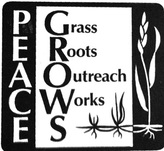Gene Sharp is a historian who specializes in nonviolence. He spent a considerable amount of time studying the rise and fall of dictators, how the people resisted, and how new changes in oppressive governments came about. He has written over a dozen works that outline the dynamics, practical applications, and strategies of nonviolence. These books have been translated into over twenty languages.
Sharp asked why dictators and other such leaders have power, and he studied how people have risen up and undermined that power. Some of his findings include the fact that the oppressive leaders have power because the people give it to them. If that power is to be overthrown, people have to band together to withdraw their support and refuse to contribute to their own oppression.
Greg was skeptical when he first heard about Gene Sharp's nonviolent techniques. Having grown up in our culture that promotes competition and considers violence to be effective and efficient, it was hard to believe that whole governments could be toppled nonviolently. However, as Greg became more involved with AFSC, he began to go back through historical events with the lens of nonviolence. As he studied history, Greg, like Sharp, started to notice how nonviolence has been around for hundreds of years, and it has been extremely effective even when nonviolence was done spontaneously and without training.
Although there have been many critics of Gene Sharp over the years, Greg does not consider most of their arguments to be valid. Some point to unsuccessful movements that have used Sharp's techniques as evidence that Sharp's work is destructive or unable to create true change. Others criticize Sharp for sharing his nonviolent tactics with the US military, claiming that the military could then manipulate people or know how to counteract the strategies. As Greg pointed out, “What [Sharp] has developed is a set of tools... that can be used constructively, and can be manipulated” (Coleridge). Overall, however, Greg believes that Sharp's tools have been used more constructively than destructively. Additionally, Sharp's techniques most often need the approval of the masses in order to function properly; if the techniques are manipulated, it is much less likely that the techniques will succeed. As far as the military learning the techniques, Greg said, “If the degree of conflict can be on the scale of who can out-nonviolently resist one another, you may have changed the whole terms of battle” (Coleridge).
Finally, one of the most important aspects of Sharp's research is the idea that the ends do not justify the means; the means and the ends are connected. As AJ Muste said, “There is no way to peace, peace is the way” (AJ Muste). Greg put it this way:
As history has shown, the people who may have very noble values and principles, but use violent means to get in power – once they get in power, they mirror... their own culture, their understanding of how you not only make change, but how you keep change... because they haven't been exposed to anything else, to other cultures, different sets of decision making, and conflict resolution.
Because of this, it is important for the people who are attempting to change the oppressive nature of their country or culture must conduct themselves in a nonviolent manner. If they think they can use violent means to create peaceful ends, they will realize that when the end arrives, it is not peaceful but violent as well. The liberators become the new oppressors. Under EXTRA find the film for Session Nine about Gene Sharp. Any comments or questions can be posted on our Discussion Forum.
John Looney Intern 2015
AJ Muste Memorial Institute. N.p., n.d. Web. 09 Apr. 2015. <ajmuste.org>.
Coleridge, Greg. "Gene Sharp Impressions." Personal interview. 19 Mar. 2015.

 RSS Feed
RSS Feed

